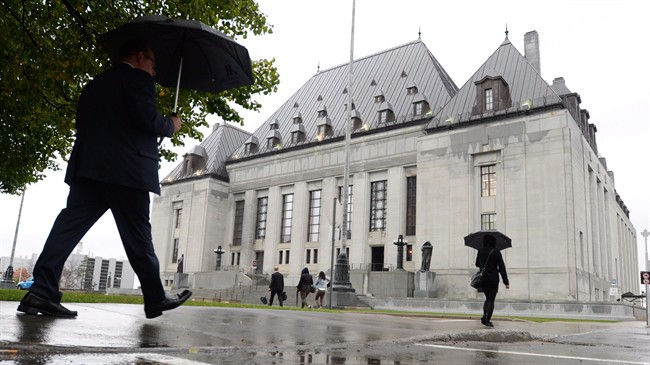The family of an Alberta woman suffering from a mental condition is thanking the courts for granting her a doctor-assisted death.

The woman, known in court documents as E.F., has severe conversion disorder, which has left her effectively blind, unable to eat and in constant pain.
A Court of Queen’s Bench judge allowed her an assisted death earlier this month and the Alberta Court of Appeal upheld the decision this week.
READ MORE: Alberta ruling makes waves in Ottawa
In a written statement, the family said it hopes the federal government will follow the ruling.
“We thank Madam Justice Bast as well as the Court of Appeal of Alberta for honouring her wish,” said the statement, released Friday by the woman’s lawyer.
“We plead with the Attorney General of Canada to respect these decisions.”
The Appeal Court ruling criticized the federal government’s proposed legislation on assisted death. The court said the bill doesn’t comply with the Supreme Court’s landmark decision as it excludes people suffering solely from psychiatric conditions.
The appeal judges also said the government shouldn’t restrict assisted dying only to those near death.
The top court has given the federal government until June 6 to come up with a new law but it’s unlikely Bill C-14 will pass before the deadline.
READ MORE: Doctors worry assisted death will become legal without a law
Legal experts believe that in the absence of a new law, the Supreme Court ruling will become the law of the land. Advocates say the practice would likely end up being regulated by professional medical colleges.
E.F.’s family said her mind is sharp and she knows what’s going on in the news.
“She has urged us time and time again to arrange for her to speak with politicians, lawyers and advocacy organizations — anyone with answers on how she could achieve her wish.”
READ MORE: Assisted-dying in Canada: What you need to know about the new law
The statement describes how the 58-year-old woman has lived in agony for the last eight years.
“It began with an intense pain on her left side and then spread relentlessly, savage like wildfire, over her entire body. She says it feels like she’s under a constant barrage of arrows from an archer’s bow. Her searing migraines are nightmares from which she cannot wake.”
Severe conversion disorder is a psychiatric condition that results in physical problems. The Appeal Court ruling said involuntary muscle spasms in E.F.’s body have left her virtually blind and in constant pain.
“She can no longer eat, dress, bathe or move …,” said the family statement.
“The pain makes it impossible for her to sleep without the help of strong medication. She cannot speak more than few words without gasping from the pain.”
The woman feels like a prisoner in her own body, the family said.
“She has lost hope that a cure for her condition exists, and for at least two years, she has asked to be put to rest.”
The family did not say when E.F. plans to die but asked for privacy in “our last precious days together.”
The court ruling said the doctor who is to assist E.F. in her death is from British Columbia.

Comments